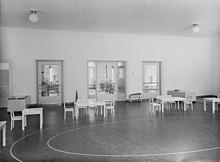Elise Braun Barnett
Elise Braun Barnett (born Elise Herbatschek November 19, 1904 in Vienna , Austria-Hungary ; died November 20, 1994 in New York City ) was an Austrian-American pianist and Montessori teacher .
Life
Elise Herbatschek was the daughter of the wood merchant Wilhelm Herbatscheck and Irma Altmann. She first received piano lessons from Richard Robert and then studied piano at the Vienna Conservatory . During this time she met Lili Roubiczek , the director of the Montessori School in Vienna , and in 1924 gave up her career as a pianist in favor of educational work. Roubiczek and Herbatschek lived with the children in the children's house , and she brought her musical skills to bear in the upbringing of the children. In 1924 Maria Montessori attended school in Troststrasse and was very impressed by Herbascheck's musical work and invited Herbatscheck to attend an international training course in London in 1925; Montessori paid the costs. Herbatscheck subsequently developed the music didactic part of Montessori pedagogy alongside Anna Maria Maccheroni .
In 1927 Herbatscheck went for two years with Elly Kastinger and Kitty Verständig that there then the politician Benegal Shiva Rao married and remained in India, on behalf of the Vienna Theosophical Society of India . They built Montessori schools in Bombay and Allahabad , for which they won support from the Indian upper class and the active collaboration of Betty Krishna Nehru (1907–1967). Herbatschek attended seminars with Jiddu Krishnamurti , whom she had already heard at lectures in Europe.
After her return, Herbatschek worked again in the children's house in Vienna, as a trainer for Montessori teachers and as a piano teacher to earn money. In 1930 and 1932 Maria Montessori invited her to Rome for music demonstrations .
Herbatschek married the engineer Rudolf Max Braun (1898–) in 1930, they had a daughter born in 1936. After that she devoted herself more to piano lessons, but continued to come to the children's home on Troststrasse twice a week to accompany the children and to refine her didactic concept.
After Austria's annexation in 1938, Elise Braun had to leave Austria with her family. Through friends they got a visa for India. In 1946 she met Maria Montessori for the last time in Delhi . In the USA Braun-Barnett published several writings on music didactics and Indian music and edited music by the Indian composer and musician Ravi Shankar .
Fonts (selection)
- Music for active children; folk tunes and music of the masters suitable for rhythmic activities . New York, Stephen Daye Press, 1957
- Westward through the Orient: glimpses, impression & recollections . Bombay: Jaico Pub. House, 1966
- Special bibliography: art music of India . In: Ethnomusicology. Vol. 14 (May 1970), pp. 278-312
- Montessori & music: rhythmic activities for young children . New York: Schocken Books, 1973
- A discography of the art music of India . Ann Arbor, Mich. : Society for Ethnomusicology, 1975
- Memories of my friends: the Calcutta Jewish families: personal wartime experiences of one Viennese Jewish family with the Baghdadi Jewish families of Calcutta, India, 1938–1947 . New York, NY: Kodesh Press, 1992
- Eleven Years in India . Manuscript. Center for Jewish History, Leo Baeck Archives
literature
- Margit Franz: Elise Braun Barnett: With music and Montessori to India , in: Margit Franz, Heimo Halbrainer (Ed.): Going east - going south: Austrian exile in Asia and Africa . Graz: Clio, 2014 ISBN 978-3-902542-34-2 , pp. 509-515
- Hildegard Hosterbach: Musical learning in Montessori pedagogy: music didactic considerations with special consideration of music pedagogical work in German-speaking countries . Münster: Lit, 2005 ISBN 3-8258-8251-9 Zugl .: Münster (Westphalia), Univ., Diss., 2004
Web links
- Literature by and about Elise Braun Barnett in the WorldCat bibliographic database
- Deborah Sulovsky: Elise Braun-Barnett on her 111th birthday , Montessori blog , November 19, 2015
Individual evidence
- ^ Franz Hammerer, Herbert Haberl: Montessori pedagogy in Austria. Review, current status and perspectives. there chapter Maria Montessori, Lisl Braun and the development work in the field of music , PDF, in: Education and Teaching, Volume 147, H. 8/1997, pp. 819–832
| personal data | |
|---|---|
| SURNAME | Braun Barnett, Elise |
| ALTERNATIVE NAMES | Herbatschek, Elise (maiden name) |
| BRIEF DESCRIPTION | Austrian-American pianist and Montessori teacher |
| DATE OF BIRTH | November 19, 1904 |
| PLACE OF BIRTH | Vienna , Austria-Hungary |
| DATE OF DEATH | November 20, 1994 |
| Place of death | New York City |
